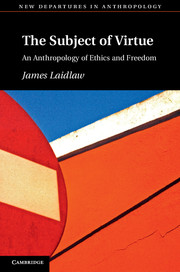Book contents
- Frontmatter
- Contents
- Acknowledgements
- 1 Beyond the science of unfreedom
- 2 Virtue ethics: Philosophy with an ethnographic stance?
- 3 Foucault's genealogy and the undefined work of freedom
- 4 The ‘question of freedom’ in anthropology
- 5 Taking responsibility seriously
- 6 The reluctant cannibal
- References
- Index
- References
2 - Virtue ethics: Philosophy with an ethnographic stance?
Published online by Cambridge University Press: 05 June 2014
- Frontmatter
- Contents
- Acknowledgements
- 1 Beyond the science of unfreedom
- 2 Virtue ethics: Philosophy with an ethnographic stance?
- 3 Foucault's genealogy and the undefined work of freedom
- 4 The ‘question of freedom’ in anthropology
- 5 Taking responsibility seriously
- 6 The reluctant cannibal
- References
- Index
- References
Summary
It is easy to see why anthropologists interested in moral life have found virtue ethics more readily congenial than any other style or school in modern moral philosophy. Virtue ethicists think that an understanding of morality requires an account of specific qualities of character, such as courage, generosity, elegance, piety, prudence, weakness, vulgarity, impertinence, or cruelty (they differ in their lists of virtues and vices), and they hold that this requires description of the relevant linguistic categories, of the moral psychology of which they are part, the practices they relate to, and the contexts and relationships in which they are acquired and used: that is to say a ‘thick’ description of a form of moral life, in exactly the sense in which, in Geertz's influential formulation (1973), good ethnographic description is ‘thick’. The attribution of a virtue, in other words, combines fact and value in just the same way as interpretive ethnographic description. For this reason, among others, it has been natural for virtue ethicists to express the view that philosophy requires ‘a dimension of social explanation’ (Williams 1985: 131) or ‘an ethnographic stance’ (Williams 1986: 203–4), or presupposes ‘interpretive ethnography’ (Moody-Adams 1997: 169), or should be ‘descriptive anthropology’ (Baier 1985: 232).
So the basis for an affinity is obvious enough. What is odd is that anthropologists’ engagement with virtue ethics has been to a striking degree monopolized by the work of Alasdair MacIntyre: an influential author, but idiosyncratic, and certainly not representative of a large and varied literature. In this chapter, the overall purpose of which is to establish the basis for ongoing dialogue between anthropology and virtue ethics, I shall attempt both to convey the power and coherence of MacIntyre's project – not always evident in some of the piecemeal invocations in the anthropological literature – and also to identify why the easy appeal his writings have for anthropologists conceals deeper reasons to be cautious. If we are to be in a position both to draw intelligently on, and to speak intelligibly to, virtue ethics, it will be important for anthropologists to appreciate the range of positions that go under the label, and what is distinctive about MacIntyre's own.
- Type
- Chapter
- Information
- The Subject of VirtueAn Anthropology of Ethics and Freedom, pp. 47 - 91Publisher: Cambridge University PressPrint publication year: 2013



